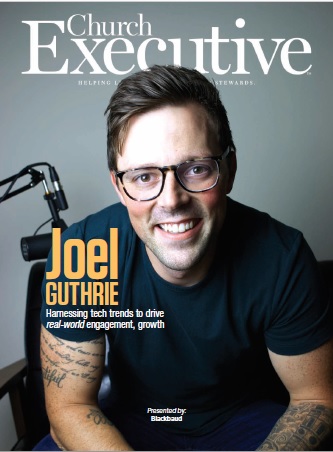
By RaeAnn Slaybaugh
![]() Joel Guthrie grew up attending church. In fact, his family helped start one in Colorado Springs.
Joel Guthrie grew up attending church. In fact, his family helped start one in Colorado Springs.
Since then, he has been on staff as a worship leader and youth leader at a church in Bellevue, Wash., and is currently one of the worship leaders and 10th-grade-guys leaders at his church in Austin, Texas.
He has also studied audio engineering and has a career working in marketing in the tech space, servicing large tech companies, including Microsoft and Amazon.
His technical know-how and passion for helping churches apply modern tools to grow and engage their communities makes him the ideal host for The Church Engagement Podcast.
From social media best practices, to using tech to help increase small group attendance, and everything in between, The Church Engagement Podcast aims to ensure technology makes it easy for congregations and communities to get involved and find opportunities to engage with their churches.
The podcast, which is sponsored by Blackbaud, the world’s leading software company powering social good, went live in spring 2019. As Senior Content Marketing Manager, Faith Solutions, at Blackbaud, Guthrie knows the market for long-form content for church leaders is “crazy oversaturated,” from eBooks to actual books, to presentations, to lengthy podcasts.
“We were trying to figure out where we could fit in in the space and be a valuable addition to the content they’re already consuming,” he explains. “That’s where the idea for a short-form podcast came to be.”
So, from the beginning, The Church Engagement Podcast has done things differently — offering content that church leaders can digest easily, quickly, and use right away.
But why tech? (And why Joel?)
For many pastors, the topic of tech can be intimidating, especially when they’re already always strapped for time. As Guthrie acknowledges, the last thing a church leader needs is one more tech to-do beating down his door: “They’re being bombarded with, ‘You need technology.’ ‘You need to be using social.’ ‘You need to be livestreaming now.’ ‘You need to have another campus.’”
Given his own background and experience in church leadership and development — as well as in tech marketing — he is all-too-familiar with this pressure-meets-time-crunch dynamic. This awareness, in fact, is what informs the direction, content (and even the guests) on the podcast.
For one thing, each episode is short enough to listen to during a pastor’s morning commute or as he makes coffee. Most are 10 to 15 minutes long. This is possible, Guthrie says, because the podcast spends less time talking about the ‘why’ than the ‘how.’
“We give listeners super actionable steps,” he explains. “So, if they’re driving to the office, they can put those steps into practice when they arrive. We try to stay super tangible.”
In terms of content, Guthrie aims to keep the podcast applicable and dynamic, for churches of all sizes. By this, he means that some listeners have the budget and staff to execute on what they learn at their churches. They primarily want to know how they can help their teams be even more effective.
“We find church leaders who want to innovate and are in the church space testing and trying things. They’re not afraid to sail with technology — to see how we can use these trends to grow and engage our church beyond the Sunday service.”
— Joel Guthrie
On the other end of the spectrum, some pastors represent smaller churches, where they’re doing everything. “So, they’re not looking for another task — they’re looking at how can they be more efficient with the time they do have.”
Personally, as the son of church planters and elders, Guthrie has observed both types of roles up close. “I think it’s just understanding the unique issues and nuances that come with church leadership, and then being able to take that knowledge and pair it with technological best practice knowledge that I’ve learned from helping these large organizations — the frontrunners of innovation in the world, and in technology. I like to be able to say, ‘Hey, this is how a church could use this technology and put it into church leadership language.”
Doing otherwise, he points out, runs the risk of sounding too corporate for most church leaders.
 An important tool takes shape
An important tool takes shape
The guests on the podcast share this passion for growing the church with technology.
“We find church leaders who want to innovate and are in the church space testing and trying things,” Guthrie says. “They’re not afraid to sail with technology — to see how we can use these trends to grow and engage our church beyond the Sunday service.”
This is critical because, as Guthrie explains, the church tends to be a few years behind on technology and tech marketing best practices. With his unique, feet-in-both-worlds perspective, he’s able to see the opportunities in tech that might have not found their foothold in the church space (yet). For this reason, he says, many of the initial podcast topics are very market-focused, “because that’s my bread and butter in my day-to-day job, as well.”
To drive these points home, Guthrie calls upon his relationships with other pastors, people he’s met at conferences and events, and more.
For example, a summer podcast with Nona Jones — head of Faith Communities at Facebook — drills down on using Facebook groups to grow your church.
“There’s a crazy statistic about how churches and faith communities are 80-something-percent of the users of groups and pages on Facebook,” Guthrie says. “So, they actually developed specific features for churches and faith communities.”
Guthrie says it’s one of the most popular podcasts. “It’s really interesting to hear somebody that’s actually advocating for our churches at Facebook to get us cool features and things like that.”

Another favorite podcast focuses on Millennials, where Guthrie welcomed his good friend Nicolai Buccino, associate pastor at Rain City Church. They discussed how to empower the next generation of leaders — many of whom aren’t instantly recognized as Millennials, but they are. And, as Guthrie points out, they’re already on staff (or dedicated members) at so many churches.
“For the past few years, I feel like the Millennials conversation has been talked about from a youth standpoint — high schoolers, college-aged kids,” he explains. “Some college-aged kids are still millennials, but a lot of us at the top end are in our 30s, so the conversation needs to shift.”
What Buccino brings to the table in the podcast are strategies to empower the Millennials on the staff and in the congregation. “They’re not looking for a boss — they’re looking for a mentor; they’re looking for opportunities to be developed,” Guthrie says. “Millennials get a bad rap for wanting to be at the top of the food chain at the beginning. But we actually just want to know the opportunity to grow is there, because we want to learn.”
To date, one of Guthrie’s favorite feedback stories is based on a podcast he did with Peter Hodgen, VP Business Development at Crowd Hub: “3 Strategies You Need to Better Engage Your Church.” They talked about a strategy for creating content for your church’s “skimmers, swimmers and divers” — in other words, short-, medium- and long-form content.
“I just love that analogy,” Guthrie explains. “Some people will spend less than 10 seconds looking at your content; others will spend 30 seconds to a minute; others will give you five to 10 minutes of their time. And we’ve got to create content that speaks to them all.”
 “Up next …”
“Up next …”
In future podcasts, Guthrie says he’d like to address the debate between multisite churches and church plants, or new campuses.
“As large churches grow, they’re wondering how they should be structured, from a technological basis, a leadership basis. “Do we want to be independent from a financial standpoint? What about from a leadership standpoint?” he explains.
“No one has really defined how to do it or which way is better,” Guthrie adds. “It’d be cool to pull a few people together to talk through each side, either as a success story or as a failure.”
He says he would also like to touch on advertising for churches — something that’s almost considered a bad word but, to Guthrie’s mind, represents a lot of opportunity for church growth.
“I’d love to get a guest to talk about a church that’s been successful.”
One thing that won’t change is the shared goal between Guthrie and Blackbaud that serves as the podcast’s basis: create valuable content pieces to help grow the church.
“Having Blackbaud, and the resources they can provide behind it, expands the reach of the podcast and allows me to take the time to create it — it’s an awesome combination,” he says. “I’m very lucky that I get to call it work. Not a lot of people get to pair their actual day job with furthering the Kingdom.”


